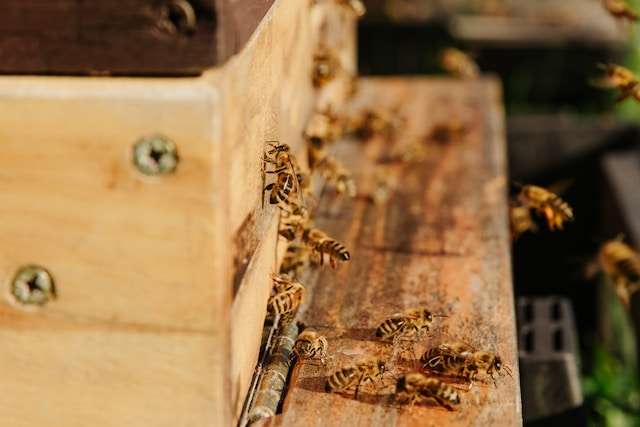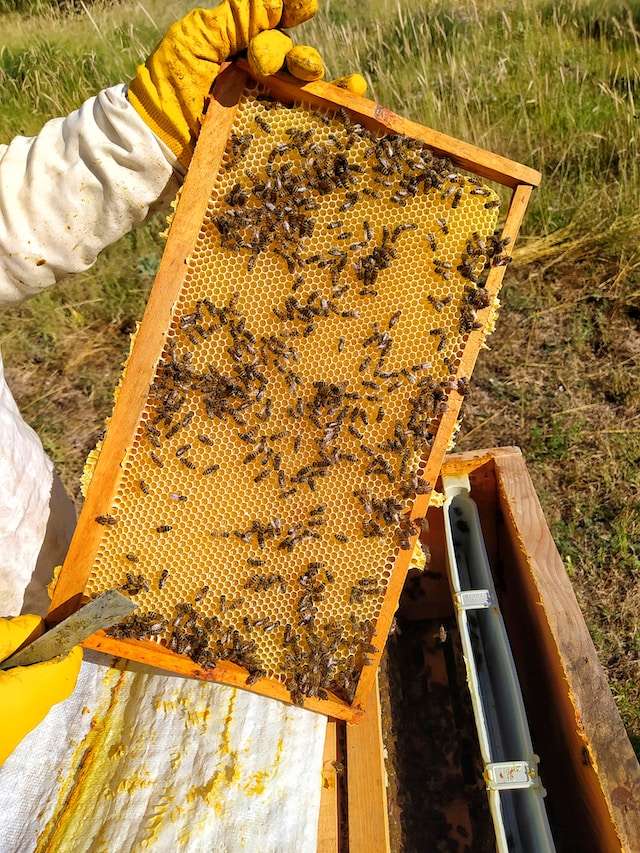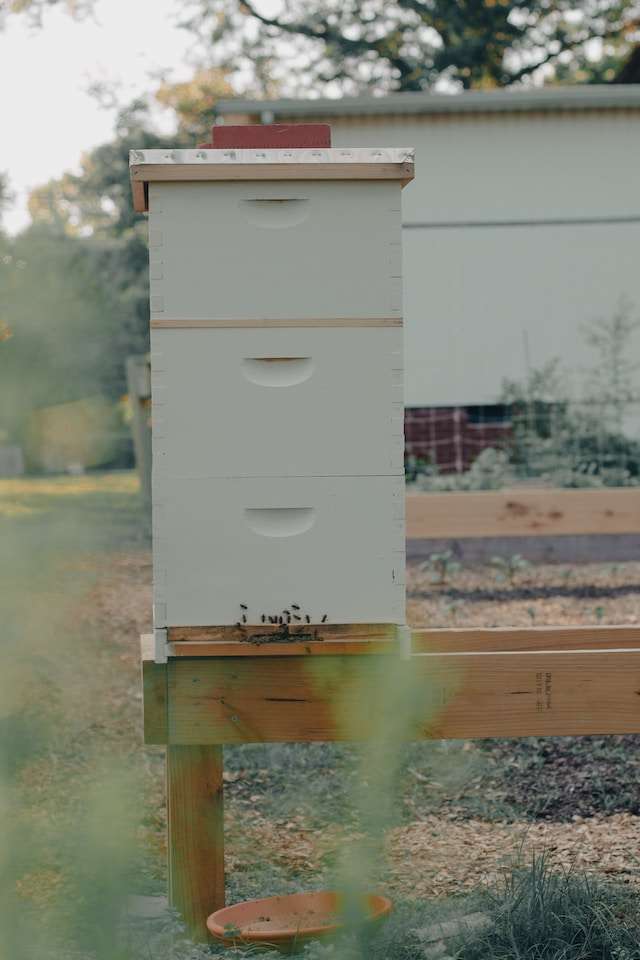Should You Carry Beekeeping Insurance?

Beekeeping has grown steadily in popularity, becoming both a flourishing hobby and a thriving industry. As more individuals are drawn to the wonders of beekeeping, it becomes increasingly important for beekeepers to understand the potential risks associated with this practice.
One crucial aspect to consider is whether or not to carry beekeeping insurance. In this article, we will delve into the importance of understanding the risks and explore the benefits of obtaining beekeeping insurance.
Understanding the Risks
Beekeeping comes with its fair share of risks, and being aware of them is fundamental to ensure safety and protect your investment.
Some key risks associated with beekeeping include:
- Liability: Bees can sting, and stings can lead to severe allergic reactions or even fatalities in some cases. As a beekeeper, you could be held liable for any injuries or damages caused by your honeybees. Understanding the potential legal implications is crucial.
- Property Damage: Honeybees often travel far and wide in search of nectar and pollen. However, neighboring properties may not welcome the presence of swarming bees. If your bees cause damage to others’ property, you may be held responsible for the resulting expenses.
- Theft and Vandalism: Unfortunately, beehive theft and vandalism are not uncommon. Thieves may target your hives for their valuable honey or other beekeeping equipment. Having insurance coverage can provide financial protection against such unfortunate events.
Understanding the Risks of Beekeeping
Here are some of the potential liabilities and property risks associated with beekeeping, as well as the potential damage it may cause to neighboring properties or crops.
Liability Risks Associated with Bee Stings and Allergic Reactions
One of the primary risks associated with beekeeping is the possibility of bee stings and allergic reactions. It is crucial for beekeepers to be aware of this risk, both for their own safety and that of others who may come into contact with the bees. Here are some key points to consider:
- Bee Stings: Bees sting as a defense mechanism when they feel threatened. While most people experience mild reactions to bee stings, such as temporary pain and swelling, some individuals may have severe allergic reactions that require immediate medical attention.
- Allergic Reactions: It’s essential to recognize the signs of an allergic reaction, which may include difficulty breathing, hives, dizziness, or swelling of the face and throat. Those who are aware of their allergies should always carry appropriate medication, such as an epinephrine auto-injector, to counteract severe allergic reactions.
- Risk Mitigation: Beekeepers should take precautions to minimize the risk of stings and allergic reactions. This includes wearing protective clothing such as veils, gloves, and suits while working with the bees. Regular inspections of the hive can also help identify potential issues and reduce the chances of an aggressive colony.
Property Risks, Such as Hive Theft or Damage Caused by Bees
Aside from the personal risks associated with beekeeping, it’s important to be mindful of potential property risks. These include hive theft and damage caused by bees. Take note of the following information:
- Hive Theft: Unfortunately, beehive theft is not uncommon. Thieves may target hives for their honey production or to establish their own beekeeping colonies. Beekeepers should take steps to secure their hives, such as using locks or placing them in well-monitored areas.
- Bee-Related Property Damage: While bees are beneficial for pollination, they can also be potentially destructive. Bee swarms may cause damage by building hives in unwanted areas, such as inside walls or attics. Honey leaks can attract other pests, leading to structural damage or attracting more bees to the property.
Potential Damage to Neighboring Properties or Crops

In addition to personal and property risks, beekeepers must be considerate of the impact their bees may have on neighboring properties and crops. Here are some important points to understand:
- Pollination Impact: Bees play a crucial role in pollinating plants, benefiting both the beekeeper and surrounding agricultural areas. However, beekeepers need to ensure that their colonies do not cause excessive damage by over-pollinating or potentially spreading diseases to nearby crops.
- Bee Flight Patterns: Bees typically fly in a three-to-five-mile range from their hive while foraging for nectar and pollen. To minimize potential conflicts with neighboring properties, beekeepers should be aware of nearby agricultural areas and coordinate with farmers to establish mutually beneficial relationships.
Benefits of Beekeeping Insurance
Now that we have identified the risks, it is essential to understand the benefits of carrying beekeeping insurance:
- Liability Coverage: Beekeeping insurance often includes liability coverage, which protects you from potential legal claims arising from bee-related accidents or injuries. This can provide peace of mind, knowing that you are financially safeguarded against unexpected legal expenses.
- Property Damage Protection: In the event that your bees cause damage to neighboring properties, your policy may cover the costs of repair or replacement. This coverage ensures that you are not personally burdened with significant financial obligations resulting from potential property damage.
- Theft and Vandalism Coverage: Beekeeping insurance can offer protection in case of hive theft or vandalism. Whether your property is located in an urban or rural area, having coverage against such unfortunate events allows you to mitigate the financial impact and quickly recover from any losses.
- Equipment Replacement: Beekeeping equipment can be quite expensive, and in the event of loss or damage, the costs of replacing essential items can add up. Some insurance policies include coverage for equipment replacement, ensuring that you can continue your beekeeping journey without significant financial setbacks.
What is Beekeeping Insurance?
Beekeeping insurance is a type of insurance policy specifically designed to provide financial protection to beekeepers in the event of injury or damages caused by their bee colonies. This insurance covers the costs associated with medical bills, legal expenses, lost or damaged property, and third-party liabilities, such as if someone else is injured by your bees.
Coverage Options and Benefits
- Property Coverage:
Under beekeeping insurance, property coverage serves as a fundamental component. This coverage typically protects buildings, equipment, hives, and other tangible assets essential for beekeeping operations. It safeguards against perils such as fire, theft, vandalism, and natural disasters like storms or floods.
By securing property coverage, beekeepers can recover losses arising from these unforeseen events, allowing for a smooth continuation of their beekeeping operations.
- Liability Coverage:
Beekeeping inherently involves interactions with the public and neighboring properties, making liability coverage crucial. This type of coverage safeguards beekeepers if they are held legally responsible for bodily injuries or property damage caused by their bees.
Additionally, it offers protection in case of accidental bee stings, as beekeepers may face potential lawsuits or medical claims. Liability coverage ensures that beekeepers can carry out their activities without undue concerns about potential liabilities.
- Product Liability Coverage:
Since beekeepers often sell honey, beeswax, pollen, or other bee-related products, it is vital to consider product liability coverage. This coverage protects beekeepers from financial losses or legal liabilities in case a product they produce causes harm or injury to consumers. Beekeeping insurance with product liability coverage is especially important in today’s litigious society, safeguarding beekeepers’ businesses and reputations.
- Business Interruption Coverage:
Beekeeping businesses heavily rely on the overall health and productivity of their bee colonies. In the unfortunate event of unforeseen circumstances such as disease outbreaks, severe weather conditions, or other issues impacting honeybee populations, the honey production might decrease or cease. In such periods of business interruption, beekeepers face significant financial challenges.
Beekeeping insurance can provide coverage for lost income, enabling beekeepers to navigate these challenging times and sustain their operations.
- Worker’s Compensation Coverage:
For beekeepers who employ workers or have volunteers helping with day-to-day activities, having worker’s compensation coverage is vital. This coverage ensures that beekeepers can cover medical expenses, lost wages, or disability benefits for any worker injured while performing their duties.
By providing this essential coverage, beekeepers demonstrate their commitment to the well-being and safety of their employees, contributing to a harmonious and productive working atmosphere.
Factors to Consider in Choosing Beekeeping Insurance
The right insurance coverage is crucial for beekeepers. Here, we explore the key factors that every beekeeper should consider when selecting beekeeping insurance.
Type and Size of Beekeeping Operation:
- Commercial or Hobbyist: The type of beekeeping operation you have will greatly influence your insurance needs. Commercial beekeepers typically have larger operations with more hives and honey production, while hobbyist beekeepers have smaller-scale operations for personal use or small-scale selling. Determine whether you fall into the commercial or hobbyist category to find insurance policies tailored to your specific needs.
- Scale of Operations: Consider the number of hives, colonies, or bee packages you own, as it will affect the scope of coverage required. Larger operations may face higher risks and potential losses, necessitating more comprehensive insurance policies. Conversely, smaller-scale beekeepers may opt for basic coverage that aligns with their operation’s size and risk factors.
Specific Coverage Needs and Budget:
- Property and Equipment Coverage: Evaluate the value of your beekeeping equipment, including hives, frames, protective gear, vehicles, and tools. Ensure that any insurance policy you consider provides coverage for potential damage or loss of these essential assets.
- Liability Insurance: Beekeeping carries inherent risks, such as bee stings and property damage caused by swarming. Liability insurance protects you and your beekeeping operation against legal expenses and claims resulting from these incidents. Assess the level of liability coverage required based on your operation’s size and potential risks.
- Product Liability: If you sell honey, beeswax, or other bee-related products, product liability insurance is crucial. This coverage protects you from claims related to the quality or safety of your products. It offers financial protection for legal expenses and potential settlements arising from product-related incidents.
- Medical Coverage: Beekeeping involves working with stinging insects, which increases the risk of bee stings and potential allergies. Consider insurance policies that provide medical coverage, ensuring that medical expenses for bee sting incidents are covered.
Reputation and Reliability of Insurance Providers:
- Research Insurance Providers: Before choosing an insurance provider, thoroughly research their reputation and reliability. Look for companies with experience in beekeeping insurance and a track record of settling claims promptly and fairly.
- Customer Reviews and Recommendations: Seek feedback from other beekeepers to understand their experiences with various insurance providers. Online forums or beekeeping associations can be excellent platforms for gathering insights and recommendations.
- Customizable Policies: Look for insurance providers that offer customizable policies suited to your specific beekeeping needs. Avoid one-size-fits-all solutions and prioritize insurers who understand the nuances of beekeeping operations.
Other Risk Mitigation Measures for Beekeepers
In addition to the foundational knowledge discussed in the above, we will now explore other essential risk mitigation measures that beekeepers should consider.
By implementing these measures, beekeepers can enhance safety, promote healthy bee colonies, and foster harmonious relationships with their surrounding communities and neighbors.
Safety precautions and proper beekeeping techniques
- Protective Gear: Donning appropriate protective gear is vital for beekeepers to minimize the risk of bee stings. A protective suit, veil, gloves, and sturdy footwear should be worn during hive inspections or honey harvesting.
- Smoking the Hive: The use of smoke can help calm bees during routine inspections. By blowing smoke gently into the hive entrance, beekeepers can disrupt communication between bees, making them less defensive and reducing the likelihood of stings.
- Proper Handling Techniques: Beekeepers should be trained in careful hive manipulation to avoid injuring or unnecessarily disturbing the bees. Using slow, deliberate movements and gentle shaking of frames can help maintain hive harmony. Extra caution is necessary when working in hot weather, as heat can agitate the bees.
- Adequate Lighting and Weather Conditions: Inspections should be conducted during daylight hours when bees are active and visibility is optimal. Avoid inspecting hives during adverse weather conditions, such as strong winds, heavy rain, or extreme temperatures, as this may agitate the bees and increase the risk of accidents.
Regular inspections by experienced beekeepers
- Importance of Regular Inspections: Regular hive inspections help beekeepers identify and address potential issues early on, ensuring the health and productivity of their colonies. Early detection of diseases, pests, or the need for additional resources like food and space is key to successful beekeeping.
- Expert Guidance: Beekeepers, especially beginners, can benefit greatly from seeking guidance from experienced beekeepers or joining local beekeeping associations. These experienced mentors can provide invaluable insights and feedback, ensuring that proper practices are followed and potential risks are effectively managed.
Educating surrounding communities and neighbors about beekeeping
- Open Communication: Building positive relationships with neighbors and the surrounding community is crucial for beekeepers. It is essential to inform them about the benefits of beekeeping in pollination and honey production, while addressing any concerns or misconceptions they may have.
- Education Initiatives: Organizing educational workshops, community events, or open hive demonstrations can help familiarize neighbors with the intricacies of beekeeping. Sharing knowledge about bee behavior, swarm prevention, and safe interaction techniques can alleviate anxieties and foster an environment of cooperation and understanding.
- Proper Hive Placement: Beekeepers should carefully consider hive placement, ensuring that they are not close to public spaces or areas with high human traffic. Maintaining a suitable distance from neighbors’ houses or common gathering places can minimize the chances of inconveniences or conflicts arising.
- Beekeeping Benefits: Highlighting the advantages of having honeybees nearby, such as improved pollination of local flora and the availability of local honey, can help neighbors appreciate the value of beekeeping, leading to greater acceptance and support.
Conclusion
While beekeeping can be a rewarding endeavor, it is crucial to be aware of the associated risks. Carrying beekeeping insurance can provide a safety net against the unexpected, ensuring that you can confidently pursue your passion while mitigating potential financial liabilities. By understanding the risks, exploring the benefits of insurance coverage, and making an informed decision, you can bee-keep with greater peace of mind. Stay protected, stay in control, and enjoy the wonderful world of beekeeping!
Frequently Asked Questions about Beekeeping Insurance
How much does beekeeping insurance typically cost?

- The cost of beekeeping insurance can vary depending on various factors. Typically, beekeeping insurance may cost anywhere from $200 to $500 per year, but this value can change based on the coverage options, number of hives, location, and other considerations.
What factors determine the cost of insurance premiums for beekeepers?
- Several factors contribute to determining the cost of insurance premiums for beekeepers. These factors may include the number of hives, the scale of operations, beekeeping experience, previous claims history, the location of beekeeping activities, and the coverage options chosen.
Are there any legal requirements for beekeepers to have insurance?
- While there are no federal-level legal requirements mandating beekeepers to have insurance, some states or local jurisdictions may require certain levels of coverage. It is crucial for beekeepers to check with their local authorities to understand any legal obligations or recommendations regarding beekeeping insurance.
What does beekeeping insurance typically cover?
- Beekeeping insurance can cover various aspects related to beekeeping operations. The coverage can typically include property and equipment coverage, liability coverage for bodily injury or property damage caused by beekeeping activities, theft or vandalism protection, coverage for damage caused by natural disasters, and sometimes even compensation for lost or damaged hives.
Can beekeeping insurance cover medical expenses in case of bee stings?
- In some cases, beekeeping insurance policies may provide liability coverage that can also extend to cover medical expenses resulting from bee stings. However, the coverage provided can differ between insurance providers, so it is essential to review the policy terms and conditions or discuss with an insurance agent to determine the extent of coverage for medical expenses.
Are there any exclusions commonly found in beekeeping insurance policies?
- Yes, beekeeping insurance policies may have certain exclusions that vary between providers. Some common exclusions may include intentional acts of harm, pollution-related claims, microbial damage to bees or hives, infestation or disease-specific claims, or damages resulting from improper maintenance or carelessness.
Can beekeepers with only a few hives qualify for insurance coverage?
- Yes, beekeepers with only a few hives can certainly qualify for insurance coverage. The availability of coverage may vary between insurance providers, so it is recommended to explore different options to find a policy suitable for small-scale operations.
Can beekeepers insure their hives and equipment against theft and vandalism?
- Absolutely. Beekeeping insurance often includes coverage for theft and vandalism, protecting beekeepers against losses resulting from stolen or vandalized hives, equipment, or other related assets. It is advisable to discuss specific coverage details with insurance providers to ensure sufficient protection.
Does beekeeping insurance offer coverage for damage caused by natural disasters?
- Yes, beekeeping insurance typically includes coverage for damage caused by natural disasters such as floods, fire, storms, or other unforeseen events. It is important to carefully review policy terms and conditions to understand the extent of coverage provided for natural disasters.
Can beekeeping insurance be customized to fit specific needs?
- Absolutely. Many insurance providers offer customizable policies to cater to beekeepers’ specific needs. These policies can be tailored to include or exclude particular coverage options based on individual requirements and risk factors.
- It is advisable to discuss customization possibilities with insurance agents or providers to ensure adequate coverage tailored to your beekeeping operations.